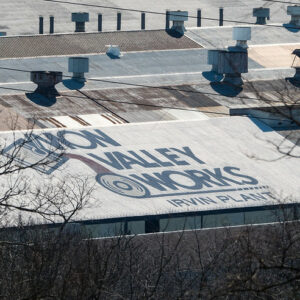A coalition of Senate Republicans is outraged over United States Steel’s (USS) announcement it is canceling upgrades and investment at its Mon Valley Works plant. And they are directing that outrage not at the steel company, but at Gov. Tom Wolf (D) and his green energy political allies.
“The loss of this $1.5 billion project is a devastating blow to the economy of southwestern Pennsylvania and a slap in the face to the hard-working blue-collar families who were counting on these jobs,” the Republican legislators said in a statement. “It is a clear reminder that we need a commonsense, cooperative strategy on energy and the economy, not Governor Wolf’s go-it-alone approach.”
One coalition member is Senate Majority Leader Kim Ward (R-Westmoreland).
“There are 3,700 jobs sitting down there at U.S. Steel,” Ward told Delaware Valley Journal. “U.S. Steel has a plant moving in Arkansas. It’s buzzing. We’re just difficult here and I think we need to kind of weigh these things.”
The Senate Republicans joining Ward include Senate President Pro Tempore Jake Corman (R-Bellefonte), Sens. Elder Vogel (R-Beaver), Camera Bartolotta (R-Washington), Pat Stefano (R-Fayette), Wayne Langerholc, Jr. (R-Cambria), Joe Pittman (R-Indiana), and Devlin Robinson (R-Allegheny).
In a statement posted on her website, Majority Leader Ward made it clear who she blames for the cancelation.
“What happened is the result of local government leaders letting radical environmental groups like PennFuture, GASP, and Breathe Project, funded in part by elitist Pittsburgh foundations, bully them into abandoning blue-collar workers, the PA Building trades, and the very heart of what built America – PITTSBURGH STEEL.”
Mon Valley Works is an integrated steelmaking operation that includes four separate facilities: Clairton Plant, Edgar Thomson Plant, Irvin Plant in western Pennsylvania, and Fairless Plant near Philadelphia. In May 2019, USS announced plans to have a new endless casting and rolling facility at the Edgar Thomson Plant. A new co-generation facility was also in the works at Clairton Plant. At the time, USS called the project an investment in state-of-the-art steel casting and rolling technology.
“Over the past two years we have carried the ball down the field as far as possible without the issuance of the permits necessary to begin construction, which we applied for when we announced the project, ten months prior to the onset of COVID-19,” said a USS press release. “We commissioned the manufacturing of the equipment and began site preparations. However, with over $170 million invested and equipment being stored in Pittsburgh-area warehouses, we’re still only at the beginning stages of project execution.”
By contrast, USS says a competing steel manufacturer in another state announced a new steel mill and will be ready to make steel this year during this same time period. “I don’t know why any company would want to invest money here if we’re going to be so difficult,” Ward said about the permit situation. “Everybody wants clean air. Nobody wants dirty air. This was going to better their carbon footprint, but yet, here we go.”
As someone who grew up in western Pennsylvania and saw what happened in the 1970s with the loss of steel jobs, Ward says it is frustrating to see the government doing things that could cause something like that to happen again.
“We have to help with regulatory reform,” says Ward. “We have to help all manufacturers in all industries, not just U.S. Steel, and I’m hoping the governor will come and work with us on these things,” said Ward. “I can’t believe he wants to put people out of work, but look what the Biden administration did with the pipeline.”
“It appears that a valuable addition to the state’s manufacturing base has been lost to Pennsylvania’s heavy-handed regulatory regime,” said Gordon Tomb, senior fellow for the Harrisburg-based Commonwealth Foundation. “Modern industrial processes are compatible with good stewardship of the environment. Only unreasonable zealots could think otherwise.”
Wolf, like fellow Democrat President Joe Biden, has made the reduction of fossil fuel use a priority in their fight against climate change. Both Biden and Wolf are pushing alternative energy sources like wind and solar and setting goals to reduce carbon emissions.
“In the absence of leadership from the federal government, states and cities are stepping up and doing their part to reduce emissions,” Wolf said during the Trump administration. “Today I am proud to declare the commonwealth’s intention to address climate change, the most critical environmental threat facing the world.”
Pennsylvania’s trade unions are not happy with USS’s decision.
“It was just two short years ago when U.S. Steel touted the project and the dedicated workforce there as essential to the future of the Mon Valley Works and Pennsylvania steelmaking,” the United Steelworkers Union in a statement to Delaware Valley Journal. “U.S. Steel management advised the union of the Mon Valley decision by text minutes before the public announcement.”
Calling it a betrayal of the workforce, USW feels the co-gen project at a minimum should proceed at Clairton.
“These broken promises don’t go unforgotten. Our contract with U.S. Steel requires a minimum amount of capital to be spent in our plants. The USW intends to enforce that.”
David Taylor, president and CEO of Pennsylvania Manufacturers’ Association, says he believes Pennsylvania is approaching a time of choosing for the state’s skilled trades and industrial union members.
“The Democrats have chosen the environmentalists – including the radical Greens – over the working people who have been the core of the party since the 1930s.”
Members of the skilled trades and industrial unions depend on industrial production for their livelihoods, but Taylor says “the Greens (for all practical purposes) want to end industrial production in this country.”
“Promises of ‘green jobs’ are worthless to a 50-year-old steelworker or boilermaker or pipeliner who already earns a good living using skills he or she has spent a lifetime developing.”

